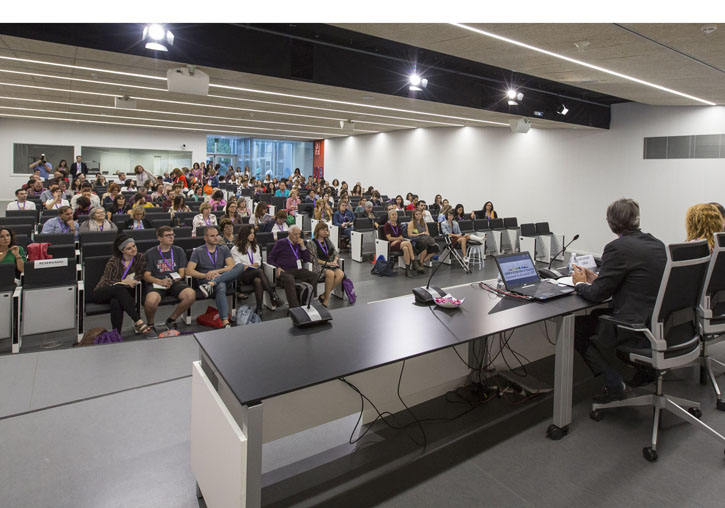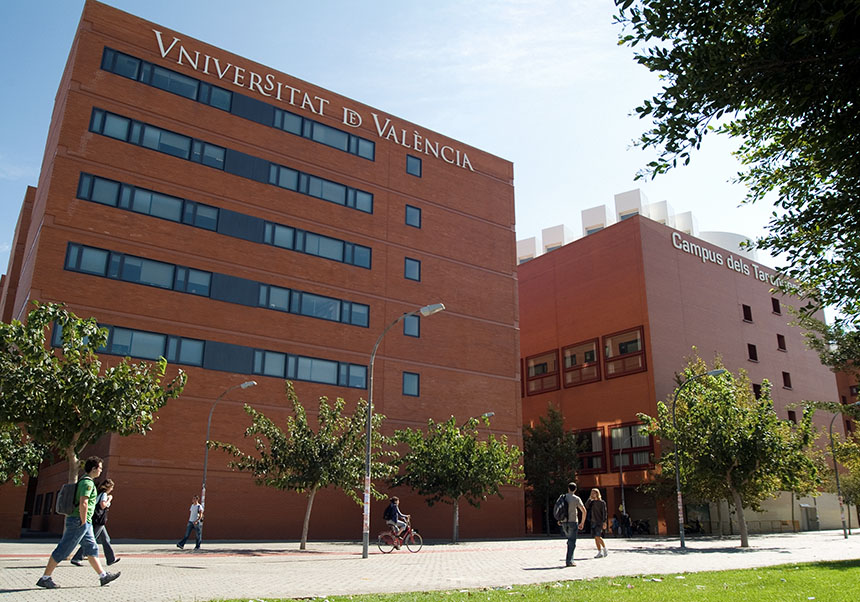Sexual Health and Ethics Specialists Discuss Diversity at 1st International Sexuality Congress
- Press Office
- October 17th, 2019

Specialists in the study of sexuality in Spain explore and debate at the Universitat Jaume I of Castelló on the possibilities and realities of sexual diversity in the First International Congress on Sexuality, organized by the SALUSEX group of the Universitat Jaume I and the Universitat de València. The sessions were held on 17th and 18th October, with conferences, debates, workshops and presentations with the aim of “serving as a stage where anyone can contribute and listen to research and experiences that show the multiple ways of expressing sexual diversity”.
The event was inaugurated by the Vice-Principal of Language Promotion and Equality, Pilar Safont; the general Director of the Valencian Agency for Equality in Diversity, José Lamo, and the Dean of the Faculty of Health Sciences, Rafael Ballester. Ballester was the first to speak, thanking those who “made this congress possible”, as well as the guest speakers, participants, institutions and the public.
“Over the years of research we have learned that there is not a single way to live sexuality. Sexual diversity is something really big and so widespread that it must go from being an exception to just being normal. No one has to ask permission to be happy and enjoy their sexuality, although there are still great scourges and a long way to go,” said the Dean.
For his part, the director of the Valencian Agency for Equality in Diversity has made a review of the actions that from the Valencian Government are promoted to “advance in a fairer society, equal and free”. Lamo Pastor also wanted to highlight the role of universities in this framework. “It is important to make diversity visible from the university centres. The academy must serve to offer methods, name and numbers to reality and from government policies we must take it into account when making decisions,” he highlighted.
Pilar Safont then added her thanks and assured that the congress “has as its essence the need and importance of expressing diversity and disseminating it. The patriarchy in which we live marks a whole series of stereotypes and social conventions that affect the vision we have when analysing and studying human behaviour. Sexuality is no exception”. In this sense, Safont has added that “linking sex and the objectification of the female body is unfortunately very easy. It is necessary to break stereotypes and understand the diversity of reality”.
Félix López Sánchez, Professor of Sexuality Psychology at the University of Salamanca, began the first presentation of the conference, highlighting the importance of ethics in sexual and amorous relationships. “Sexuality is in the realm of freedom. We have to learn how to use it, avoid bad habits and enjoy the good ones,” he defended. “We come from a repressive morality that comes from the dictatorship and from past years. We can say that we have abandoned it, with some exceptions, but we have not been able to replace it with an ethic of freedom, and that causes problems. Sexuality has become a field of mines and unpleasant surprises,” he added.
For López Sánchez, the main crimes against sexual freedom are those that attack autonomy, dignity, equality and property of life, the body and sexual intimacy. All are “crimes that are destructive to both the victim and the aggressor. It is important to understand that whoever misuses sexuality always loses and destroys oneself.” The solution would be, for the Professor, to look for a “positive approach” understood as the “ethics of consent”.
“If we analyse studies and data, we will be able to see that the results are worrisome. One has the feeling, when watching the news, consulting the daily press or just by looking around, that everything is misfortune and outrage. But, in my opinion, there is hope,” he said. The Doctor in Sexual Psychology has defended that “human sexuality is a marvellous dimension. It is not something that we are, it is something that we have” and he highlighted the advance that has meant for society “to stand up and free our arms and our hands”, since we have infinite possibilities and variables within diversity: “We can love in a thousand different ways, communicate in different ways”.
Accompanying his explanations with poetic quotations and reflections, López Sánchez has delved into what he has considered to be the “great principles” of the ethics of sexuality. Thus, he explained the importance of understanding that the human being “is a geography of pleasure and well-being. Our erogenous zones are privileged tourist areas and there are infinite possibilities”, and he has urged those present to “use sexuality because we have a marvellous world to travel through”.
In this sense, he assured that human beings are made for contact and bonding since they are social beings and not solitary. “We are children until old age, bonds are the first thing that develops in our lives and the last thing that is lost, whether loving, sexual or empathic-social. Losing ties is an emotional tragedy”. He also insisted on the key factor of ethics and reason: “Our best resource is lucid reason, this it is the compass of ethics. That is why sexual diversity is an ethical issue, because there will be no ethic without freedom. Sexuality is not an instinct, it is a drive”.
“During sex, clothes can be thrown away wherever we want. But freedom cannot be thrown on the floor or out of the window. Much less leave it outside the room. It must be present every single time”, López Sánchez has stated after reviewing some important cases of harassment and other experiences that call into question the freedom of consent and sexual identity Along with freedom of consent, there is also the need for loyalty with the aim of achieving a healthy affective and sexual relationship. “I am not talking about faithfulness because it is not a universal principle. Loyalty is. In the relationships and bonds that we create there is a need to be loyal, honest, to relate in a dignified way and to avoid the language of deception” he stated.
To conclude, the Professor affirmed: “We must never forget tolerance of diversity. It is necessary to accept different forms of living as a couple and to understand sexuality, supporting minorities and defending them”. Finally, he warned of the risk that minorities run to create “hostile discourses towards the common because they are tired of suffering and their situation”. Minority groups must also “understand and accept the sexual identity of the majority”, always keeping in mind the need to tolerate any diversity, represented to a greater or lesser extent.
File in: Formació complementària















